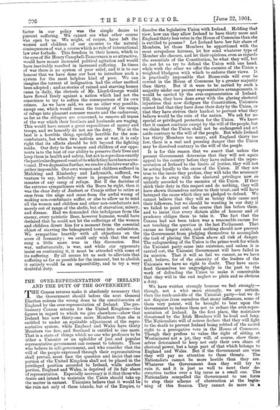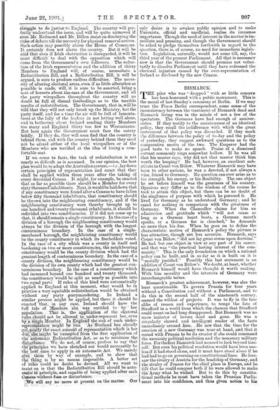THE OVER-REPRESENTATION OF IRELAND AND THE DUTY OF THE GOVERNMENT.
THE Census returns make it absolutely necessary that the Government should before the next General Election redress the wrong done to the constituencies of England by the over-representation of Ireland. The pre- liminary Census returns for the United Kingdom—the figures in regard to which we give elsewhere—show that Ireland has now thirty-one more Members than she is entitled to under an equitable adjustment of the repre- sentative system, while England and Wales have thirty Members too few, and Scotland is entitled to One more. That is a state of things which no one who professes to be either a Unionist or an upholder of just and popular representative government can consent to tolerate. Those who believe in self-government, and who Consider that the will of the people expressed through their representatives shall prevail, must face the question and insist that one portion of the United Kingdom shall not be placed in the privileged position accorded to Ireland, while another portion, England and Wales, is deprived of its fair share of representation. Especially necessary is it that those who desire and intend to maintain the Union should take up the matter in earnest. Unionists believe that it Would be the ruin not only of these islands, but of the Empire, to dissolve the leak° latiye Union with Ireland. Holding that view, how can they allow Ireland- to have thirty more and England thirty less votes in the House of Commons than she is entitled to possess ? Let Ireland have her fair share of Members, let those Members be apportioned with the most scrupulous fairness, let her send whatever type of Member she chooses, and let their opinions, even as regards the essentials of the Constitution, be what they will, but do not let us try to defend the Union with one hand. while with the other we offer the enemies of the Union a weighted bludgeon with which to enforce their views. It is practically impossible that Home-rule will ever be carried in the House of Commons by a greater majority than thirty. But if it were to be varried, by such a majority under our present representative arrangements, it would be carried by the over-representation of Ireland. Till, then, they have done away-with the glaring electoral injustices that now disfigure the Constitution, Unionists cannot feel that they have done their duty by-the Union, or that they have striven their hardest to prevent what they believe would be the ruin of the nation. We ask for no special or privileged protection for the Union. We know that it cannot continue except by the will of the people, but we claim that the Union shall not be endangered and set aside contrary to the will of the people. But while Ireland has thirty Members too many, and England thirty too i few, there s a real and pressing danger that the Union may be dissolved contrary to the will of the people.
It is for this reason that we assert that unless the present Government determine that they will not again appeal to the country before they have reduced the repre- sentation of Ireland to the limits of justice, they will not be acting loyally to the cause of the Union. If they are true to the cause they profess, they will take the necessary steps to do away with the electoral privileges now so unfairly accorded th the enemies of the Union. If they shirk their duty in this respect and do nothing, they will have shown themselves untrue th their trust, and will have betrayed the cause which they are pledged to defend. We cannot believe that they will so betray their cause and their followers, but we 'should be wanting in our duty if we failed to point out the course that lies before them, and to insist that every dictate alike of honour and of prudence obliges them to take it. The fact that the Census had not been taken was a reasonable excuse for not touching the question in the last Parliament. That excuse no longer exists, and nothing should now prevent the Government from pledging themselves to accomplish the task of placing the Union above all risk of danger. The safeguarding of the Union is the prime work for which the Unionist party came into existence, and unless it is carried out, the Unionist Government will have failed in its mission. That it will so fail we cannot, as we have said, believe, for of the sincerity of the leaders of the Unionists we have no right to doubt. They have sacri- ficed themselves too ungrudgingly in the past to the work of defending the Union to make it conceivable that they will in the end neglect so plain and so obvious a duty.
We have written strongly because we feel strongly-- though, not a whit more strongly, we are certain, than the rank-and-file of the Unionist party—but we do not disguise from ourselves that many influences, some of them very potent, will be brought to bear upon the Government to induce them not to reduce the over-repre- sentation of Ireland. In the first place, the resistance threatened by the Irish Members will be loud and long. The Nationalists will of conrse 'declare that they will fight to the death to prevent Ireland being robbed of the Sacred right to a prerogative vote in the House of Commons. Though they profess to value the right of sitting at Westminster not a jot, they will, of course, show them- selves determined to keep not only their own share of electoral power; but a large part of that which belongs to England and Wales. But if the Government are wise they will pay no attention to these threats. The Nationalists cannot be more hostile than they are. Whatever the Government does they will try to ruin it, and it is just as well to meet their de- structive tactics over a big issue as a small one. The Nationalists compelled the Government to use force to stop their scheme of obstruction at the begin- ning of this Session. They cannot do more in a iggle to do justice to England. The country will per- fectly understand the issue, and will be quite unmoved if even Mr. Redmond and Mr. Dillon insist on disobeying the rules of debate till the necessity for physical removal 'arrives. Slick action may possibly alarm the House of Commons. It certainly .does not alarm the country. But it will be said that 'e-ven if Irish obstruction is disregarded, it will be most difficult to deal with the opposition which will come from the Government's own followers. The reduc- tion of the Irish representation and the addition of thirty Members to Engl d of course, necessitate a Redistribution Bill, and a Redistribution Bill, it will be argued, is sure to produce endless difficulties. The neces- sity of altering electoral areas, even if as little alteration as possible is made, will, it is sure to be asserted, bring a nest of hornets about the ears of -the Government, and all the party wirepullers throughout the country will no doubt be full- of dismal forebodings as to the terrible results of redistribution. The Govermnent, that is, will be tad that they will not Only break up the Ministry, but the party. itself, and for a time the air will be full of lamenta- tions at the folly of the leaders in not letting well alone, and in bothering about Ireland sending thirty Members too Many and England thirty to few to Westminster. But here again''the Government must face the outcry boldly. If they do, they Will soon find that the country is behind them, and with the country behind them they need net be afraid either of the local wirepullers or of the Members who are terrified at the idea of losing a com- fortable seat.
If we come to facts, the task of redistribution is not nearly. so difficult as is assumed. In our opinion, the best plan would be to adopt the Australian system ,—i.e.,lay down certain principles of representation and enact that they shall be applied within three yeara after the taking of every decennial Census. 'It might, for example, be enacted that as far as possible there should be a Member for every sixty theusand inhabitants. Next, it.wouldbe laiddown that if any constituency were found after a Census to have fallen below fifty thousand inhabitants, that constituency should be thrown into the neighbouring constituency, and if the neighbouring constituency were thereby brought up to one hundred and twenty thousand inhabitants, it should be redivided into two constituencies. If it did not come up to that, it should remain a single constituency. In the case of a division Of a borough the neighbottring constituency would always be. the division of borOUgh With the longest cetiterminous boundary In the case of a single membered borough, the neighbeiliing 'Constituency would be- the douhty'constitueney in which its freeholders voted. In the Case of a city_.whWi was a county in itself and bordering on two or more constituencies, the neighbouring constituency would be the county division which had the greatest length Of conterminous boundary. In the case of a county division, the neighbouring constitueney would be the division of its own county which had the greatest con- terniinous boundary. In the Case of a constituency which had increased beyond' one hundred and twenty thousand, the constituency would be split as nearly as possible into two equal parts. If rules of this kind were automatically applied to England at this moment, what would be in practice a very equitable redistribution would be obtained without any party gerrymandering. In Ireland a sbuilar process might be applied, but there it should be enacted' that, in any case, Ireland should have the full tale of *nthers she was entitled to by her population. . That is the applic. alien_ of the electoraL ruleslhould not be allowed to..3.mder-represent her, even Member; pi ngland the risk of such Under- repreAWation might be "'kin As .SCOtlancl has already gOkirneaky the exact amount Of representation which IS her atm she might be *exempted from the first application Of the Redistribution Act, so as to minimise the diSturbance. We do not, of course, profess- to "say that thgprinciples we have sketched out would necessarily be the best ones to apply in an automatic Abt. We merely give them by way of eiarnple, and to she*" that the thing is by no meant.; impossible. A better set of -itileS could no doubt be devised All we want to insist on is that the Redistribution Bill should be aute- ingie i6'prinaple, and Capable of being applied after each Census-without fuss Or disturbance.
We will . say no more it present On the matter. Our only desire is to awaken public opinion and to make Unionists, official and unofficial, realise its immense importance. Though the need of interest in the matter is im- mediate and pressing, and though the Government should be asked to pledge themselves forthwith in regard to the question, there is, of course, no need for immediate legisla- tion. Legislation, naturally, would not come till, say, the third year of the present Parliament. All that is necessary now is that the Government should promise not volun- tarily to dissolve Parliament until they have redressed the electoral injustice caused by the over-representation of Ireland is disclosed by the new Census.











































 Previous page
Previous page